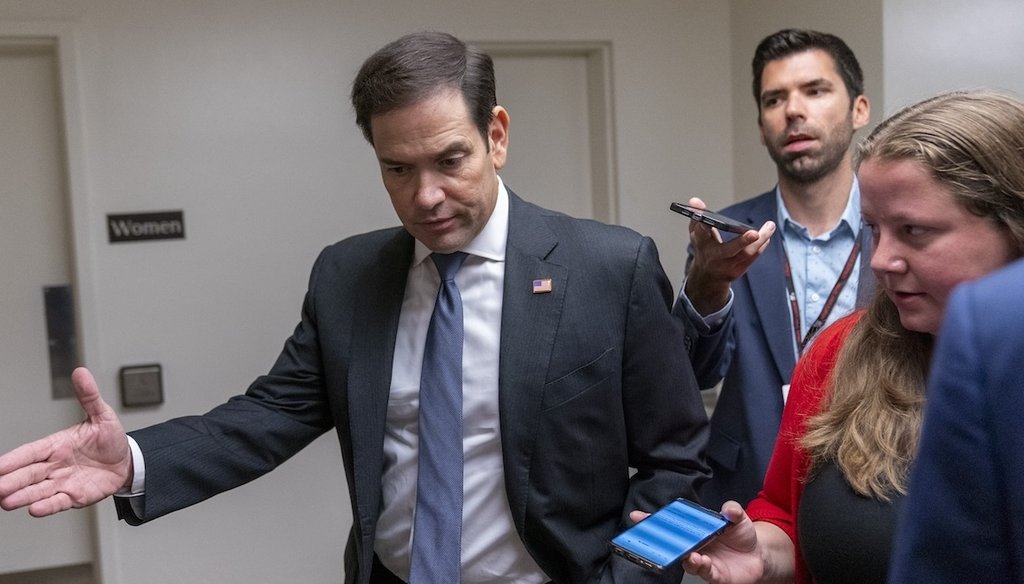

Our only agenda is to publish the truth so you can be an informed participant in democracy.
We need your help.


Sen. Marco Rubio, R-Fla., speaks with reporters as he walks to a vote on Capitol Hill on Sept. 6, 2023. (AP)
Inflation compounds and it has risen by about 19% over the last three years.
In summer 2022, inflation peaked at about a 9% increase compared with one year earlier. But since June 2023, year-over-year inflation has run between 3% and 3.7%.
Compared with February 2020, the month before the pandemic began, and also compared with one year ago, wages have increased faster than prices.
With Americans telling pollsters that they’re weary of inflation, Sen. Marco Rubio, R-Fla., accused President Joe Biden of misleading voters about how much rising prices have eased.
"It's very misleading when (Biden) says (inflation) used to be at 9%," Rubio told Fox News’ Harris Faulkner April 11. "This is compounding. It’s not like it went down from 9% to 3%. This is building month after month. The better way to think about it is that it’s 18%, 19% over the last three years."
Inflation has improved significantly on Biden’s watch. In summer 2022, inflation peaked at about 9% compared with one year earlier. But since June 2023, year-over-year inflation has run between 3% and 3.7%. That’s a marked improvement, even though it’s not quite down to the 2% level the Federal Reserve Board wants to see before it lowers interest rates.
Rubio has a point that inflation accumulates, and that the increase over the past three years has been around 19%.
However, Rubio is misleading by failing to note another key factor: rising wages. Prices don’t increase in a vacuum; they can be canceled out, or nearly so, by rising wages.
"Measuring changes in well-being requires bringing in wages — the capacity to pay these higher prices," said Douglas Holtz-Eakin, president of the center-right American Action Forum.
Although it may not be obvious to consumers frustrated with rising grocery prices, wages are outpacing inflation when compared with the prepandemic level.
Rubio’s office did not answer an inquiry for this fact-check.
We looked at how two standard federal statistics have evolved in recent years: The consumer price index, a monthly price inflation gauge for a fixed basket of goods, and average hourly earnings for all private employees, a monthly measurement of how worker pay changes.
Although Rubio’s has accurately assessed inflation’s compounding, these measurements are highly sensitive to different time frames. So, it’s easy for politicians to cherry-pick time periods that suit their arguments.
"Sen. Rubio can define inflation over any time span he wishes," said Gary Burtless, an economist with the Brookings Institution, a Washington, D.C., think tank. "But what's sauce for the goose is sauce for the gander. President Biden is also free … to measure inflation over any time span he wishes."
Wages have risen 15.9% since January 2021, Biden’s first month in office. That increase in wages has eased the inflationary hit to consumers. But compounding inflation means overall prices have outpaced this increase.
Biden, however, fares better when using two other credible time frames.
One is to compare today with February 2020, the last full month before the coronavirus pandemic hit. The pandemic represented such an economic upheaval that February 2020 is a plausible benchmark for a "normal" economy.
Using the prepandemic comparison, inflation is up by 20.4% since February 2020, but wages are up by 21.5%. So, over this period, worker pay has absorbed all the price increases and then some.
Another comparison focuses on the most recent data and should better predict future trend lines.
From March 2023 to March 2024, inflation rose by 3.5%, but wages increased 4.1%. Again, over this period, workers’ wage gains outpaced rising prices.
Dean Baker, an economist with the liberal Center for Economic and Policy Research, added that Biden isn’t using an obscure or twisted statistic to make his point on inflation.
"Biden is talking about inflation the way we always talk about inflation, as an annual rate," Baker said. "He's not pulling a fast one here. That is absolutely the standard way to discuss inflation."
Rubio said, "It's very misleading when (Biden) says (inflation) used to be at 9%. This is compounding. It’s not like it went down from 9% to 3%. This is building month after month. The better way to think about it is that it’s 18%, 19% over the last three years."
Inflation compounds, and it has risen by about 19% during Biden’s presidency.
However, it’s not "very misleading" for Biden to say inflation has eased, given that wage gains have cushioned the blow of higher prices.
Since February 2020, and also over the last year, wages have increased faster than prices.
The statement is partially accurate but omits important details, so we rate it Half True.
Marco Rubio, Fox News interview, April 11, 2024
Federal Reserve Bank of St. Louis, Consumer Price Index for All Urban Consumers: All Items in U.S. City Average, accessed April 16, 2024
Federal Reserve Bank of St. Louis, Average Hourly Earnings of All Employees, Total Private, accessed April 16, 2024
Email interview with Gary Burtless, senior fellow at the Brookings Institution, April 16, 2024
Email interview with Dean Baker, economist with the Center for Economic and Policy Research, April 16, 2024
Email interview with Douglas Holtz-Eakin, president of the American Action Forum, April 16, 2024
In a world of wild talk and fake news, help us stand up for the facts.
